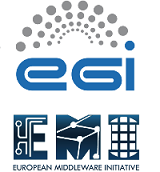Speakers
Overview
The aim of EU FP7 DECIDE, which stands for Diagnostic Enhancement of Confidence by an International Distributed Environment, is to design, implement, and validate a Grid-based e-Infrastructure building upon the EU FP7 neuGRID results and relying on the Pan-European GEANT backbone and its supporting NRENs.
DECIDE is developing a translational medicine service utilizing computer-aided techniques and innovative new diagnostic markers with the ultimate goal of supporting clinical decision making and facilitating the diagnosis of Alzheimer’s disease and Schizophrenia from multimodal medical imaging and patterns.
DECIDE will offer access to largely distributed reference databases of both normal and pathological cases as well as massive computing resources together with demanding image processing tools.
To this extent, DECIDE will demonstrate preliminary achievements in the development of its technological platform and more particularly a first and promising diagnostic tool, so-called G
URL
www.eu-decide.eu
Impact
DECIDE will enable clinicians from participating hospitals, with no access to sophisticated computational algorithms, nor massive computing resources, and large sets of reference data to efficiently carry out complex diagnostic analyses and to obtain further support in clinical decision making processes.
DECIDE involves several Consortia specialized in neurodegenerative diseases such as Alzheimer Europe, the EADC and DIMI. This confers DECIDE a significant advantage in the test and provision of diagnostic tools to a large community of clinicians in Europe and beyond.
The demonstrated diagnostic tool will potentially address a critical issue arising when doctors at small hospitals try to perform SPM-based analyses on their suspected AD patients. As in SPM the accuracy of hypoperfusion maps is strictly related to the number of normal studies compared to the test image, a large set of images of normal patients is required. On the other hand, due to ethical issues and to the high costs of neuroimaging technologies, PET and SPECT studies on normal subjects are very rare and are covered by privacy and security issues. As a consequence, neurologists working at small hospitals, neither locally owning large sets of images from normal patients, nor being able to access in a secure way remote normal image databases, cannot perform such analyses. The presented application enables doctors from such peripheral hospitals to access large sets of PET/SPECT images from normal patients, distributed on the Grid at main medical research institutes, extracting statistical data from selected normal images and collecting it without disregarding the strict privacy and security policies of health institutions.
Last but not least, DECIDE will define with National and European regulatory agencies protocols and rules for the qualification of experts allowed to use the service for clinical diagnostic purposes, which may lead to revolutionizing near-future clinical practices at the point of c
Conclusions
With this first and live demonstration, DECIDE intends to kickoff a series of concrete presentations of diagnostic tools, as further progress is made and biomarkers are integrated in the system.
To this end, DECIDE works in concert with neuGRID, where the latter is the incubation environment for new biomarkers development, test and large-scale clinical assessment and where the former is the production quality platform provisioning access to resulting new diagnostic tools together with accompanying support to clinicians.
Health professionals will therefore utilize DECIDE as an online powerful, high quality of services and deterministic platform to efficiently analyze multimodal medical imaging data, with instant access to automated second opinion useful to their daily routine work.
Although specialized, DECIDE will remain open to new and enabling diagnostic tools integration with the longer-term perspective of expanding to other brain and organ pathologies.
Description of the work
DECIDE is a 2-year EU FP7-funded project, with expected high infrastructural impact.
DECIDE has started implementing and integrating several services ranging from (i) authorization and secure access to large distributed databases of reference images, to (ii) computationally demanding image processing algorithms, and to (iii) local image processing tools for diagnostic tool developers conforming with ethical regulations of concerned countries. DECIDE is thus working on the integration and packaging of several pipelines, which will become diagnostic services made available to clinicians over a distributed production-quality and highly performant grid infrastructure leveraging on the high-capacity GEANT and NREN Internet network.
During this year’s edition of the EGI User Forum, DECIDE intends to demonstrate how physicians can seamlessly connect to the distributed environment through a simple and user-friendly Web portal. The LifeRay-based Web portal exhibits several applications integrated within a Single Sign On framework coupled with a robot-certificate making it as easy and secure to connect to the grid as is to enter your online bank.
Once connected, visitors will be presented a promising diagnostic tool, GriSPM, allowing an early diagnosis of Alzheimer Disease through the comparison of cerebral functionality of a neurological subject versus an appropriate reference data sets of normal subjects. GriSPM has been specifically designed for the remote processing of Emission Tomography (SPECT and PET) neuroimages through the Statistical Parametric Mapping (SPM) algorithm, pointing out statistically significant regional changes of cerebral functional parameters. It is implemented as an open-to-authorized user, web service including: (a) remote access to Grid-distributed databases of normal subjects numerically appropriate for statistical analysis, and (b) a Grid-distributed computationally efficient SPM version, tailored for the diagnosis of neurological diseases.

